Badger Maps Alternatives
Explore 10 alternatives to Badger Maps. This guide compares features, pricing, and use cases to help you choose a sales route planner.

Many sales teams use Badger Maps, and for good reason. The tool is effective for route planning and mapping customer territories. It helps reps visualize sales data, making fieldwork more organized and saving time on the road.
However, some users report occasional routing issues or find it expensive. This is why we analyzed top alternatives to see how they compare. We'll look at their pros and cons to help you find the right fit for your team. Let's get started.
11x: Digital Workers for Sales
For teams interested in digital workers for sales, 11x is a relevant option. It provides AI assistants to manage routine sales activities. This allows your sales representatives to concentrate on customer relationships and close more deals.
11x is a GTM platform with AI agents that manage the sales process. Alice finds prospects and updates the CRM; Julian qualifies inbound leads and books meetings. The system unifies data enrichment, outreach, and email warmup into one platform.
Badger Maps Alternatives
The following section provides a detailed review of top Badger Maps alternatives. We will analyze each tool's pricing, core features, and specific pros and cons compared to Badger Maps.
1) Map My Customers
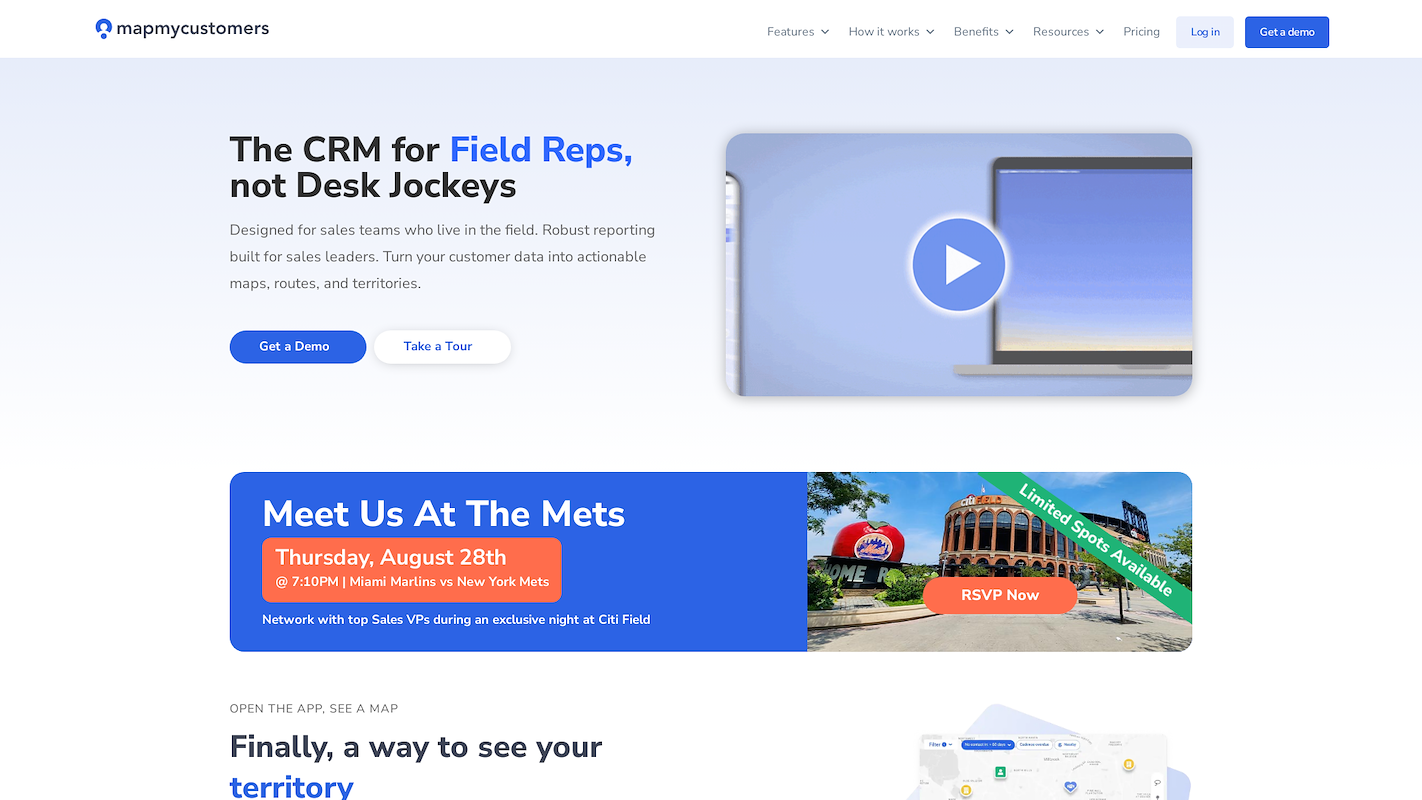
Map My Customers is a mobile-first CRM for field sales teams. It converts customer data into visual maps, efficient routes, and sales territories. The platform provides reports that sales leaders can use for decisions.
Use cases include the replacement of spreadsheets with a map view of all accounts. Teams can plan travel routes, find underserved areas, and log activities on mobile devices immediately after appointments.
Map My Customers's Main Features
- The platform includes a lead finder to discover new prospects on the map that fit ideal customer profiles.
- It offers live location tracking, allowing managers to see where representatives are in real time as they work their routes.
- The system provides an automatic mileage tracker for expense reporting and reimbursement purposes.
- Its mapping analytics suite helps identify product-sales trends, competitor locations, and new market opportunities.
Map My Customers vs. Badger Maps
Average Review score: 4.5/5 stars based on 136 G2 reviews.
- Map My Customers offers deeper CRM integrations, including with accounting software like QuickBooks, which provides a more unified data view compared to Badger Maps's export-focused approach.
- It includes sales performance management and gamification tools to help managers monitor team activity, a feature set not central to Badger Maps.
- The tool automatically logs activities like calls and emails, reducing manual data entry for reps, while Badger Maps primarily focuses on manual check-ins.
- Its built-in lead finder helps reps discover new prospects along their routes, offering a more integrated prospecting experience than Badger Maps.
Where Map My Customers Compares To Badger Maps
- Map My Customers provides fewer customization options for data visualization than Badger Maps. Users sometimes have limited ability to adjust map layers or data filters for specific sales needs.
- Its route planning is generally effective but can be less powerful for complex, multi-stop schedules compared to Badger Maps. Some sales reps find its optimization is not as precise for very dense territories.
- The platform sometimes experiences software glitches, especially on the mobile app. These can cause data sync delays, an issue that some users note is less common with Badger Maps.
Cost-Effectiveness and Pricing Plans
Map My Customers is more affordable for individuals at $50 per user per month, compared to Badger Maps's $58 Business plan. For teams, Badger Maps's Enterprise plan at $95 per user is a more cost-effective option than the $110 Team plan from Map My Customers.
2) Route4Me
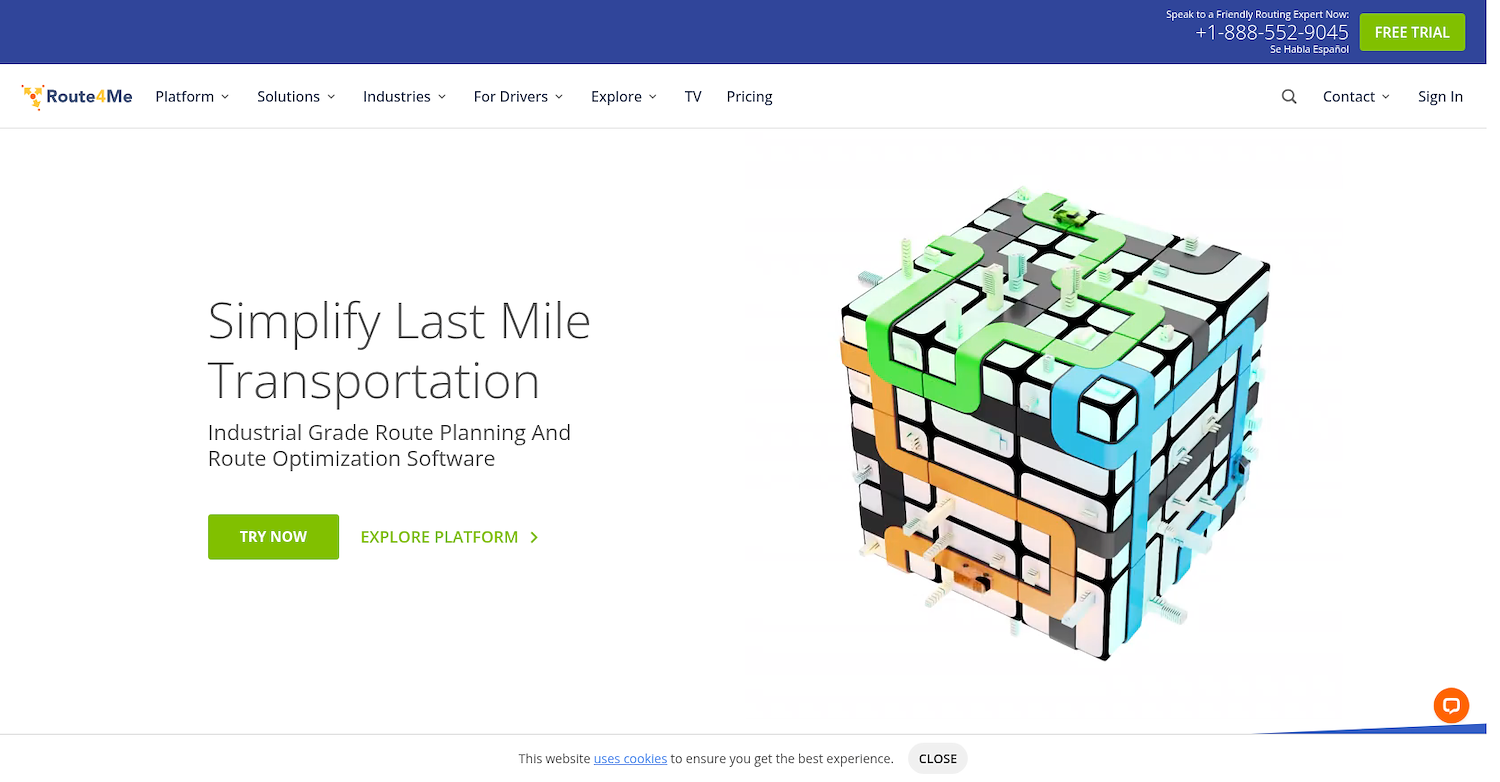
Route4Me is a platform for last-mile transportation. It automates complex route plans for delivery, field-service, and mobile workforces. The system designs multi-stop routes and lets managers follow progress in real time.
Use cases include daily delivery optimization and field-service technician schedules. The platform has optimized over 3 billion miles for more than 40,000 customers worldwide.
Route4Me's Main Features
- Its optimization engine uses patented algorithms to balance constraints like time windows, vehicle capacities, and traffic.
- The platform provides commercial truck routing that accounts for height, weight, and hazmat restrictions to avoid fines.
- It includes driver efficiency tools such as mobile proof-of-delivery with sign-on-glass, photo capture, and GPS-tracked check-ins.
- The system offers business operations automation for workflows, vehicle loading, and territory balancing.
Route4Me vs. Badger Maps: Key Differences
Average Review score: 4.6/5 stars based on 102 G2 reviews.
- Route4Me provides advanced tools for last-mile delivery logistics, which differs from the sales territory management focus of Badger Maps.
- The platform supports commercial truck routing with considerations for vehicle size and weight. In comparison, Badger Maps plans routes for standard passenger cars.
- It includes proof-of-delivery tools like photo capture and signatures. This provides more detailed verification than the manual check-ins in Badger Maps.
- The tool connects with telematics hardware for live fleet tracking. Badger Maps does not have this type of direct hardware integration.
Where Route4Me Compares To Badger Maps
- Route4Me does not offer the same level of sales data visualization as Badger Maps. It lacks features for color-coding accounts or creating sales territories, which are useful for strategic planning.
- The tool is not designed as a sales CRM. Unlike Badger Maps, it does not include functions for logging customer interactions or managing sales pipelines directly within the application.
- Its interface is built for logistics, which some sales users might find less intuitive. For instance, importing and verifying customer lists can sometimes require more manual steps than in Badger Maps.
- The platform's reporting tools are focused on logistics metrics. It can be difficult to generate sales-specific reports, such as performance by territory, a feature that is more developed in Badger Maps.
Cost-Effectiveness and Pricing Plans
Badger Maps offers per-user pricing, with its Business plan at $58 monthly, making it suitable for individuals. In contrast, Route4Me uses a flat-rate model starting at $250 per month, which can be more cost-effective for larger teams. You can check the detailed pricing on Route4Me's official website.
3) SPOTIO
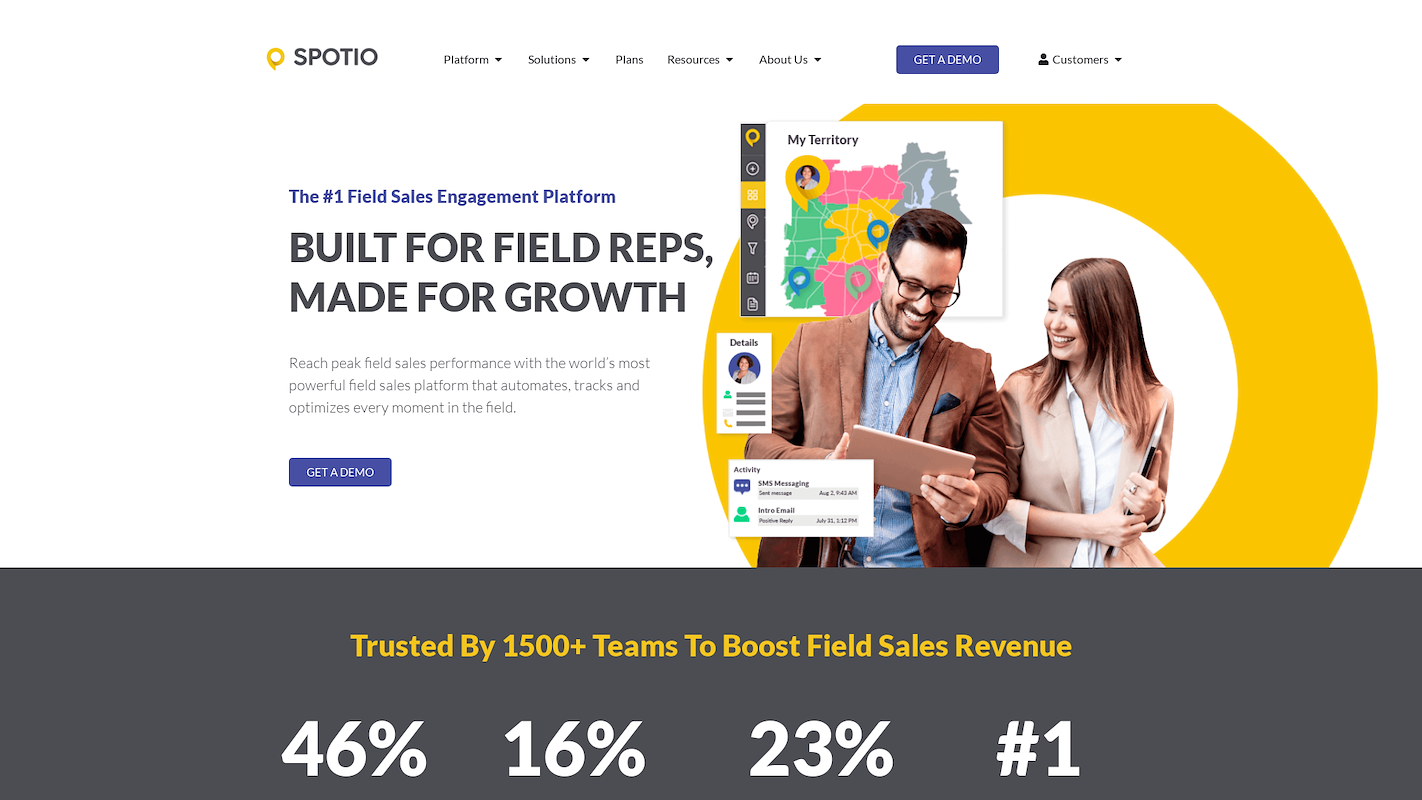
SPOTIO is a field sales engagement platform for outside sales teams. It automates and tracks off-site activities to increase rep productivity and revenue. Use cases include lead qualification in the field, appointment setup, and route optimization. The platform provides managers with real-time visibility into team performance.
SPOTIO's Main Features
- The platform provides hybrid multi-channel communication tools, allowing reps to manage calls, texts, and emails from one interface.
- It includes an AutoPlays feature that automates outreach and follow-up sequences using predefined templates.
- The system has a lead generation function with prospect intelligence data to help identify new sales opportunities.
- It offers digital business cards for a quick exchange of information between sales reps and potential customers.
SPOTIO vs. Badger Maps: Key Advantages
Average Review score: 4.5/5 stars based on 380 G2 reviews.
- SPOTIO offers a complete sales engagement suite with multi-channel communication tools. This allows reps to manage calls, texts, and emails from one place, a feature not available in Badger Maps, which focuses on mapping.
- The platform provides automated outreach sequences called Autoplays to manage follow-ups. This reduces manual work for reps, unlike Badger Maps, which requires manual check-ins and activity logs.
- It includes sales performance management features like leaderboards to motivate reps. In comparison, Badger Maps centers on route optimization and does not offer similar tools that track competitive performance.
- The system centralizes various sales activities, such as CRM mapping and prospecting, into a single interface. This integrated approach differs from Badger Maps, which often requires users to export data to other systems for full sales cycle management.
Where SPOTIO Compares To Badger Maps
- SPOTIO offers solid route planning for daily sales trips. It sometimes lacks the precision of Badger Maps for complex, multi-stop schedules in very dense territories.
- The tool provides fewer options to customize data visualization. Compared to Badger Maps, users have less control over map layers or detailed data filters for strategic analysis.
- Some users note connectivity problems in areas with poor service. This can sometimes cause the app to load slowly, a less common complaint for Badger Maps users.
- Its primary focus is on sales engagement, not just mapping. Therefore, its route optimization engine is not as specialized as Badger Maps, which is built for territory visualization.
Cost-Effectiveness and Pricing Plans
Badger Maps offers plans at $58 and $95 per user, providing clear pricing tiers. SPOTIO does not publicly list its pricing, so a direct cost comparison is not possible. For detailed pricing, we recommend visiting SPOTIO's official website.
4) Skynamo
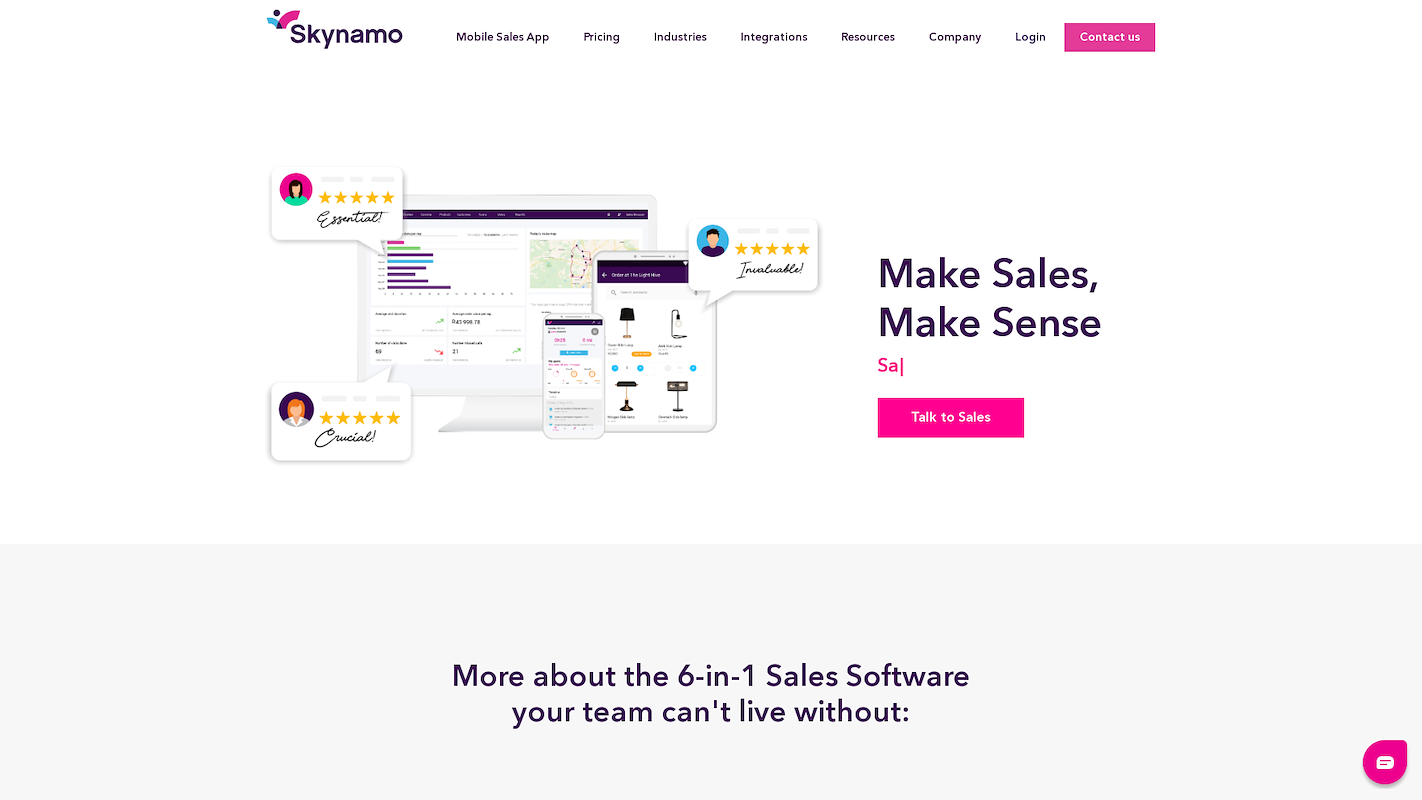
Skynamo is a field sales platform for manufacturers, wholesalers, and distributors. It helps sales teams handle customer relations and capture orders. The platform connects with ERP and accounting systems and gives reps mobile access to current stock, prices, and customer data.
Reps use it to plan daily visits, access customer history, and capture orders. Managers can track team activity and get reports on sales performance.
Skynamo's Main Features
- The platform integrates with over 700 ERP and accounting systems, which keeps data synced between field representatives and back-office operations.
- Its mobile sales app allows reps to create live orders on-site, view real-time stock and pricing, and automatically log visits and calls.
- The system includes Skynamo RADAR, an analytics module that provides revenue intelligence to identify profit drains and offers predictive sales forecasting.
- It features customer intelligence tools to analyze buying patterns and predict churn, with recommendations to boost loyalty.
Skynamo vs. Badger Maps: Key Advantages
Average Review score: 4.5/5 stars based on 174 G2 reviews.
- Skynamo offers deep integration with ERP and accounting systems. This provides reps with live data, unlike Badger Maps, which is built for exporting route and customer data.
- The tool allows sales reps to capture orders directly in the app with real-time stock and pricing data. Badger Maps, in comparison, is a planning and logging tool and does not have built-in order placement.
- It provides managers with detailed sales performance dashboards. The analytics in Badger Maps center more on route efficiency and territory coverage, not direct sales metrics like order volume.
- The platform includes customer intelligence tools to analyze buying patterns. This provides strategic account insights, a feature not central to the route-focused design of Badger Maps.
Where Skynamo Compares To Badger Maps
- Skynamo provides route planning for daily visits. Its optimization is less specialized than Badger Maps for complex schedules in dense territories, which can sometimes result in less efficient routes.
- The tool's data visualization focuses on sales metrics. It does not offer the advanced map customization of Badger Maps, which provides detailed color codes and data filters to analyze territories.
- Its interface combines many sales functions. For reps who only need mapping, this can be less direct than the streamlined, map-focused user experience in Badger Maps.
- Some users report occasional software glitches or data sync delays, particularly with order processing. This might require an app restart to resolve, an issue less common for the core functions in Badger Maps.
Cost-Effectiveness and Pricing Plans
Badger Maps has clear per-user pricing at $58 for its Business plan and $95 for Enterprise. Skynamo does not publish its pricing, which prevents a direct cost comparison. For accurate pricing details, we recommend visiting Skynamo's official website.
5) Salesforce Maps
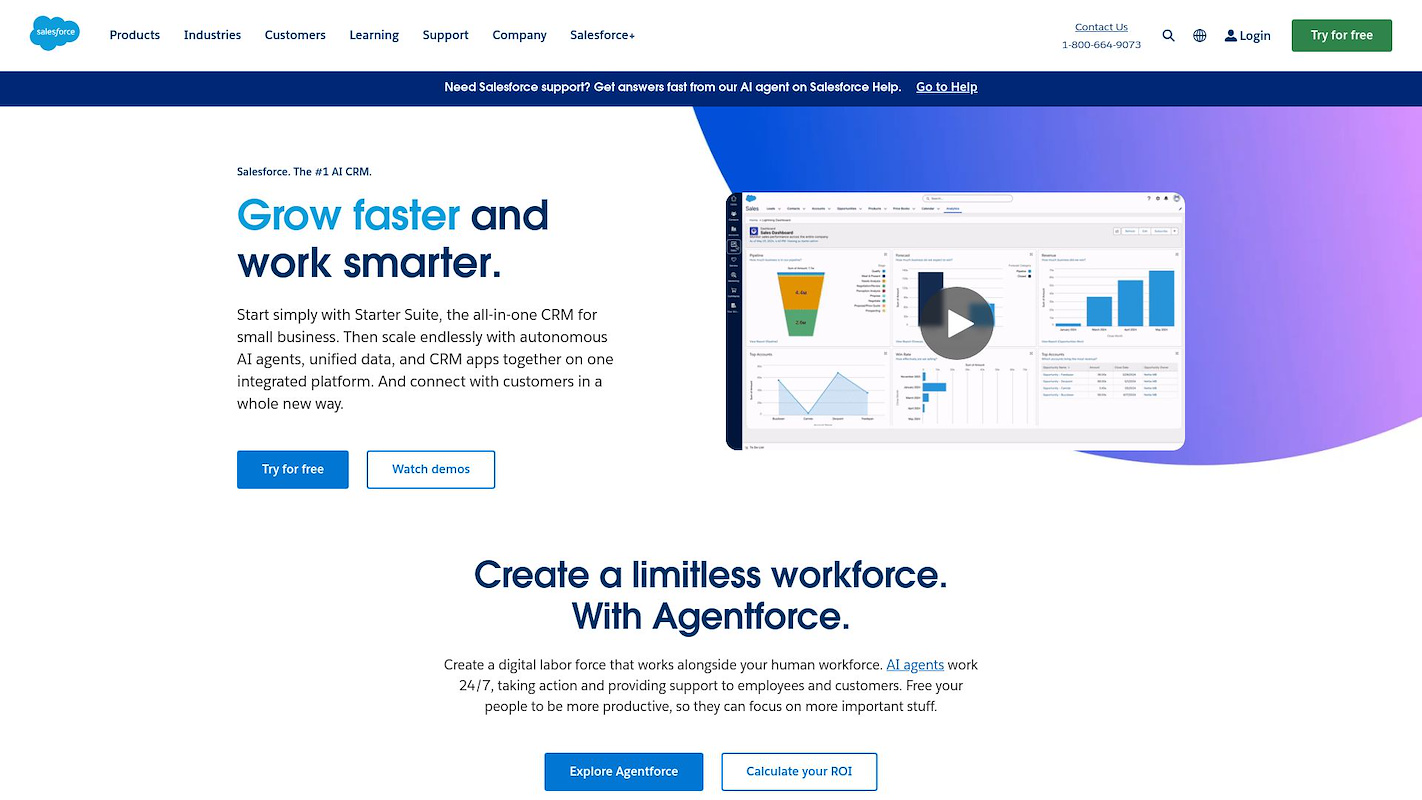
Salesforce Maps is a location intelligence tool native to the Salesforce platform. It helps sales teams visualize their CRM data on an interactive map. This supports territory design and account distribution among representatives.
Use cases include route optimization for field visits and the identification of new opportunities within specific geographic areas. The tool aids sales enablement through a geographic view of accounts, leads, and contacts.
Salesforce Maps's Main Features
- The platform overlays third-party market data, such as business and demographic datasets, onto the map for deeper territory analysis.
- It uses filters like the Einstein Score or potential revenue to color-code and prioritize accounts, contacts, and opportunities.
- The tool provides embedded guidance with step-by-step checklists and prompts to ensure visit compliance and help onboard new representatives.
- It plots any Salesforce object, including custom ones, directly onto an interactive map, moving beyond standard accounts and contacts.
Salesforce Maps vs. Badger Maps: Key Advantages
Average Review score: 4.3/5 stars based on 480 G2 reviews.
- Salesforce Maps integrates natively with Salesforce, using live CRM data directly on the map. This differs from Badger Maps, which often relies on data exports for its mapping functions.
- The tool overlays third-party business and demographic data onto maps for deeper analysis. Badger Maps, in comparison, primarily visualizes a user's existing customer data.
- It plots any Salesforce object, including custom ones, on the map. This provides more flexibility than Badger Maps, which typically maps standard account and contact data.
- The system includes embedded checklists to guide sales reps during visits. This feature helps with process compliance, an area not covered by Badger Maps's route-focused toolset.
Where Salesforce Maps Compares To Badger Maps
- Salesforce Maps often has a steeper learning curve due to its deep feature set. Some users report that the initial setup is more complex than the more direct onboarding process of Badger Maps.
- Its functionality depends on clean data within the main Salesforce CRM. Badger Maps, in contrast, offers more flexibility by allowing easier data imports from spreadsheets and other sources.
- The tool is an add-on to Salesforce, which means an additional cost. This can be less budget-friendly for teams compared to the standalone pricing plans offered by Badger Maps.
Cost-Effectiveness and Pricing Plans
Badger Maps has clear pricing, with its Business plan at $58 and Enterprise plan at $95 per user. Salesforce Maps pricing is not public, but it is considered a premium-priced add-on, with user reviews placing it in the highest cost tier. For a detailed quote, visit the Salesforce Maps official website.
Consider 11x for Sales Automation
If your team spends significant time on manual tasks, consider a different approach. 11x provides digital workers that handle prospecting, lead qualification, and CRM updates. This frees up your sales team to focus on high-value activities like closing deals.
For organizations looking to integrate automation into their sales workflow, 11x is a practical option. You can find more details about its AI agents on the company's website.
With 11x, we run your sales playbook from start to finish. Alice identifies accounts, enriches their data, and handles outreach. Julian manages calls, qualifies prospects, and sets up meetings. Our platform replaces multiple tools in a GTM stack, handling everything from intent signals to email warmup.
Book a demo to see 11x in action.
6) eSpatial
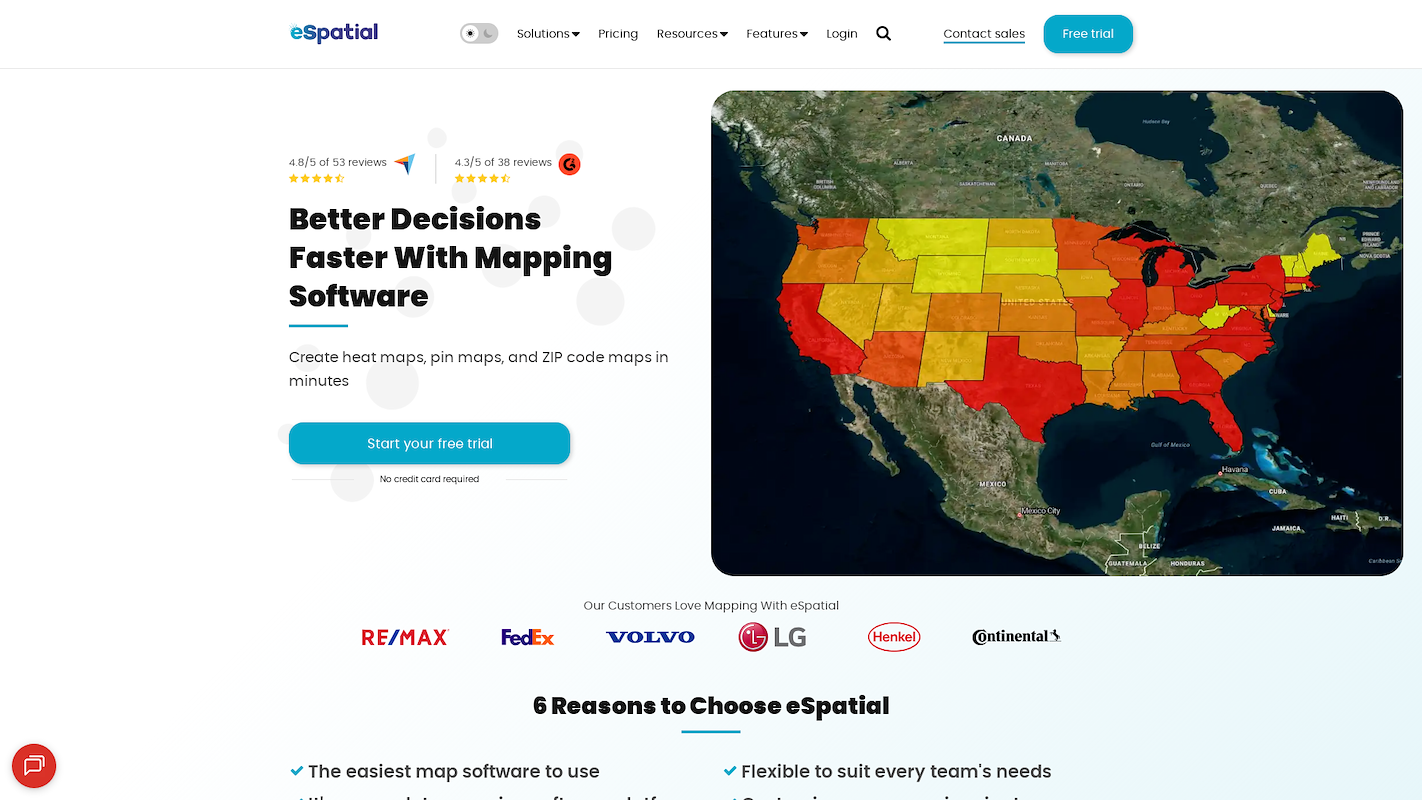
eSpatial is a mapping software that converts business data into location intelligence. The platform creates interactive maps from spreadsheets to help sales teams visualize accounts. Use cases include territory design, route planning, and market analysis. It supports sales enablement through data-driven map visualizations.
eSpatial's Main Features
- The platform provides a scenario-planning tool for "what-if" modeling to test different business strategies.
- It includes territory design and optimization tools with features for workload balancing, overlap detection, and scenario planning.
- The system offers proximity, radius, drive-time, and distance analysis tools for location-based insights.
- It supports multi-user collaboration with granular sharing and permission settings for team projects.
eSpatial vs. Badger Maps: Key Advantages
Average Review score: 4.3/5 stars based on 38 G2 reviews.
- eSpatial provides advanced territory design tools that include workload balancing and scenario planning. This offers more strategic depth than the territory management features in Badger Maps.
- The platform includes hotspot and regional heat maps to identify market opportunities. This is a more specialized analysis tool compared to the general data visualization options in Badger Maps.
- It allows users to overlay demographic data onto maps for marketing analysis. Badger Maps, in contrast, focuses on the visualization of a company's existing customer data.
- The tool offers a "what-if" scenario planning feature to model different business strategies. This provides a predictive analysis capability not present in Badger Maps.
Where eSpatial Compares To Badger Maps
- eSpatial provides route planning for daily visits. Some users find its optimization is less precise for complex, multi-stop schedules compared to the specialized routing engine in Badger Maps.
- Some users report that the platform can occasionally experience slow performance. This is different from Badger Maps, which is generally noted for a more consistent mobile app experience during fieldwork.
- The tool's interface is built for deep data analysis and territory design. For sales reps who only need quick route planning, this can feel less direct than Badger Maps's streamlined, map-first user experience.
Cost-Effectiveness and Pricing Plans
Badger Maps provides per-user pricing at $58 for its Business plan and $95 for Enterprise. In contrast, eSpatial offers an annual subscription starting at $1,495 for its Pro plan. This makes Badger Maps more cost-effective for individual sales reps, while eSpatial's model may fit teams focused on strategic territory analysis.
7) Repsly

Repsly is a retail execution platform for consumer packaged goods (CPG) field teams. It connects field activities with back-office operations. Reps use the tool to manage store visits, collect data on product placement, and process orders.
Managers can monitor team activities and analyze retail conditions to measure in-store performance. The platform helps teams execute their retail strategy.
Repsly's Main Features
- The system uses AI image recognition to convert shelf photos into insights in under 60 seconds, with 98% SKU-level accuracy.
- It provides merchandising workflows for planogram compliance, on-shelf availability checks, and promotional execution.
- The platform features agile tasking, allowing managers to instantly reprioritize visits for product recalls or pricing audits.
- It offers a field sales toolkit that includes a flexible product catalog, order entry, and retail sales reporting.
Repsly vs. Badger Maps: Key Advantages
Average Review score: 4.3/5 stars based on 52 G2 reviews.
- Repsly provides retail execution tools to check planogram compliance and promotional execution. This is different from Badger Maps, which is a general route planner for field sales.
- It uses AI image recognition to turn shelf photos into actionable data. Badger Maps lacks this type of retail-specific data collection tool.
- The platform allows reps to place orders directly in the app with a flexible product catalog. Badger Maps is used to record visit details and does not include order entry.
- The system features agile tasking, which lets managers reprioritize visits instantly for urgent needs. This is more flexible than the pre-planned routes in Badger Maps.
Where Repsly Compares To Badger Maps
- Repsly provides route planning for daily visits, but its optimization is less precise for complex schedules compared to Badger Maps. Some users note a limit of 25 locations per day, which can be restrictive.
- The tool's data visualization on maps is less detailed than what Badger Maps offers. It lacks the same level of custom color-coding or filtering options for strategic territory analysis.
- Its interface is built for retail execution, not just mapping. For sales reps who only need route planning, the user experience in Badger Maps can feel more direct and focused.
Cost-Effectiveness and Pricing Plans
Badger Maps has clear per-user pricing at $58 for its Business plan and $95 for Enterprise. Repsly does not publish its pricing, which prevents a direct cost comparison. For accurate pricing details, we recommend visiting Repsly's official website.
8) Mapsly
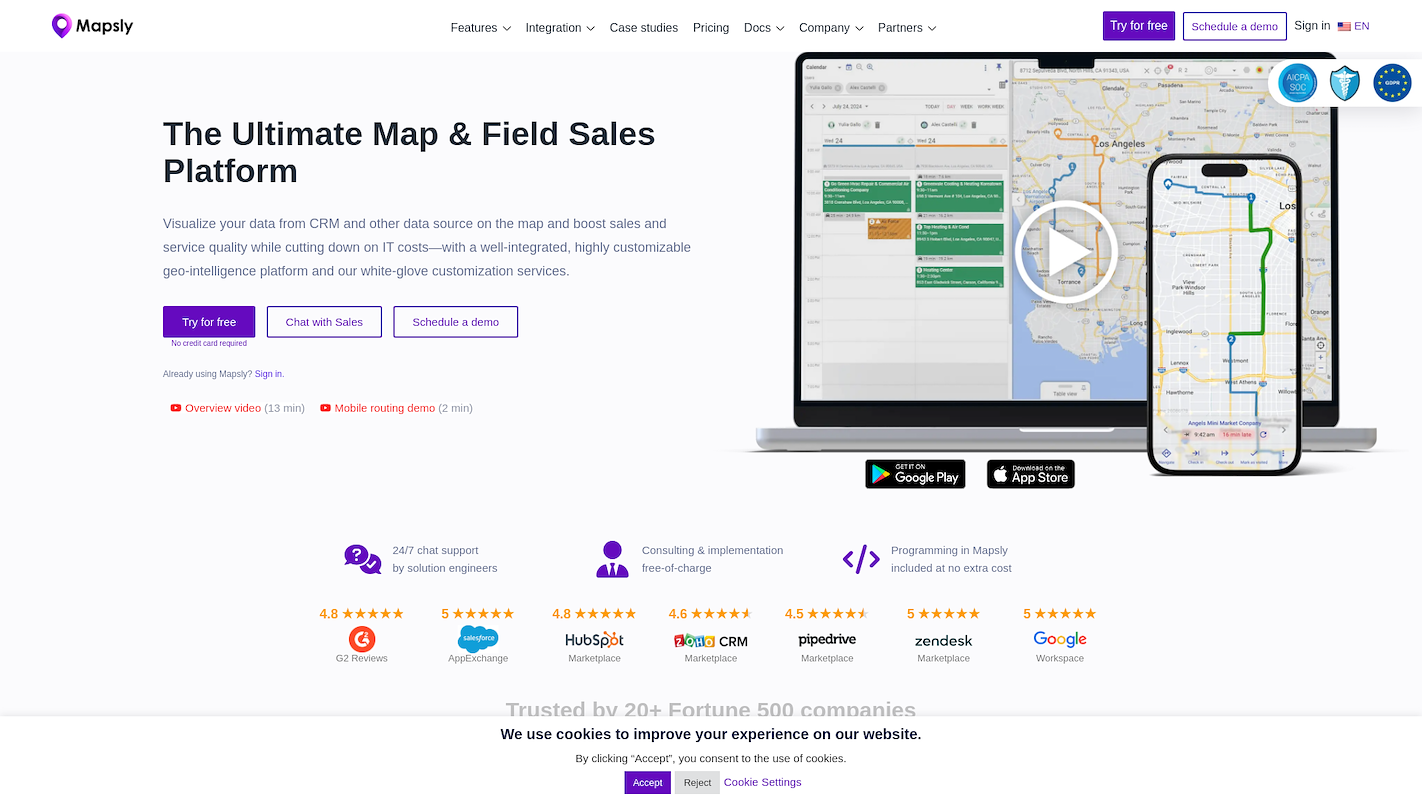
Mapsly is a geo-intelligence platform that connects to a CRM to place data on an interactive map. Sales teams use it for territory management and route optimization. The tool also supports automated prospect searches and territory analysis, which helps with sales enablement.
Mapsly's Main Features
- The platform includes a no-code automation suite to build custom workflows for sales and service processes.
- It overlays US Census demographic data onto maps, which helps with market analysis and territory planning.
- The system provides advanced routing that optimizes for multiple days and users, including overnight routes.
- It offers configurable check-ins with geofencing and adaptive forms for detailed visit management.
Mapsly vs. Badger Maps: Key Advantages
Average Review score: 4.6/5 stars based on 25 G2 reviews.
- Mapsly includes a no-code automation suite to build custom workflows. This provides more process control compared to Badger Maps, which focuses on manual planning and logging.
- It provides advanced routing for multi-day and multi-user schedules, including overnight plans. This is more complex than the daily route optimization found in Badger Maps.
- The tool overlays US Census demographic data onto maps for market analysis. In comparison, Badger Maps visualizes a user's existing customer data without this external layer.
- Its check-in feature is configurable with geofencing and adaptive forms for detailed visit data. This offers more control than the standard manual check-ins in Badger Maps.
Where Mapsly Compares To Badger Maps
- Mapsly has a steeper learning curve due to its extensive feature set. Some users report its initial setup is more complex than the straightforward onboarding process found in Badger Maps.
- The tool's interface combines many functions, including a no-code automation suite. For reps who only need route planning, this can feel less direct than Badger Maps's map-focused user experience.
- Its functionality depends on clean data within a connected CRM. Badger Maps, in contrast, offers more flexibility by allowing simple data imports directly from spreadsheets.
Cost-Effectiveness and Pricing Plans
Mapsly is more cost-effective across all tiers, with plans starting at $25 per user per month. In comparison, Badger Maps's lowest-priced plan is $58 per user. For enterprise needs, Mapsly's $70 plan is more affordable than Badger Maps's $95 option.
9) MyRouteOnline

MyRouteOnline is a web-based route planner that converts address lists from spreadsheets into optimized travel routes. The tool helps sales teams plan territory visits and appointment schedules to reduce travel time and fuel costs.
Its use cases extend to delivery services and technician dispatch. The platform focuses on route optimization for multi-stop journeys.
MyRouteOnline's Main Features
- The platform imports address lists to plan optimized routes.
- It exports routes to GPS devices or mobile apps and provides a live map.
- The system allows users to edit and save routes for future use.
MyRouteOnline vs. Badger Maps: Key Advantages
Average Review score: 4.5/5 stars based on 10 G2 reviews.
- MyRouteOnline offers a credit-based pricing model starting at $14.95. This provides more flexibility for users with occasional routing needs compared to Badger Maps's fixed monthly subscription plans.
- The tool has a quick learning curve focused purely on route optimization. This is different from Badger Maps, which includes more complex territory management and CRM features.
- It allows users to directly export optimized routes to various GPS devices. This process is more direct for simple routing tasks than the integrated sales activity logging in Badger Maps.
- The platform specializes in bulk address imports from spreadsheets. This makes it a simple choice for users who do not need the advanced data visualization and filtering that Badger Maps provides.
Where MyRouteOnline Compares To Badger Maps
- MyRouteOnline does not include CRM features to log sales activity. In comparison, Badger Maps allows reps to record customer interactions and manage sales data directly on the map.
- The tool lacks advanced data visualization. Unlike Badger Maps, it does not offer features like color-coding accounts or filtering data to analyze sales territories.
- It is not designed for strategic territory management. Badger Maps, on the other hand, provides tools to create, balance, and manage sales territories for long-term strategy.
Cost-Effectiveness and Pricing Plans
MyRouteOnline offers flexible pricing with credit-based plans starting at $14.95 for occasional use and fixed monthly subscriptions. Its monthly plans, Pro at $34.95 and Premium at $59.95, are more affordable than Badger Maps's Business plan at $58 per user. This makes MyRouteOnline a cost-effective option for users focused purely on route planning.
10) SalesRabbit
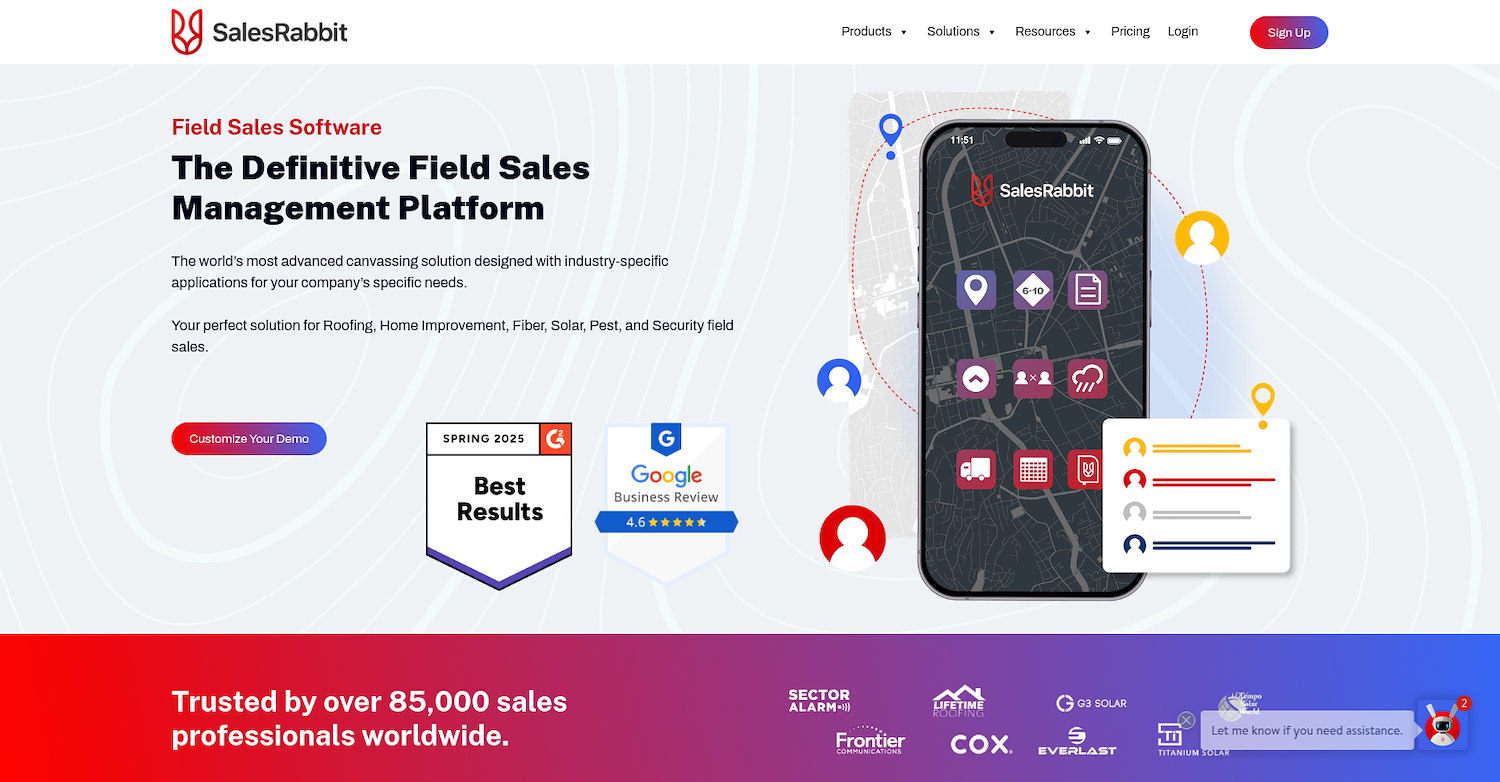
SalesRabbit is a sales enablement platform for outside sales teams. It provides tools to manage leads, plan routes, and track team activity. The system supports door-to-door and other field sales operations, with a mobile app for territory management and customer interactions.
SalesRabbit's Main Features
- Includes leaderboards and incentives for sales performance management.
- Provides automatic representative assignment to help manage territories.
- Offers lead priority settings to guide sales activities.
- Supports strategic selling with custom territory mapping and dashboards.
SalesRabbit vs. Badger Maps: Key Advantages
Average Review score: 4.5/5 stars based on 412 G2 reviews.
- SalesRabbit includes sales performance tools like leaderboards and incentives to motivate reps. This is different from Badger Maps, which centers on route efficiency rather than competitive team metrics.
- The tool provides lead priority settings to help guide daily sales activities. In comparison, Badger Maps visualizes customer data but does not have a similar feature to rank leads by importance.
- It supports automatic representative assignment to help manage territories. This automates a task that is typically a manual process within Badger Maps.
- The platform offers a broader sales enablement suite, including tools for digital contracts. This contrasts with Badger Maps, which is a specialized tool focused on route planning and territory visualization.
Where SalesRabbit Compares To Badger Maps
- SalesRabbit offers route planning, but its optimization can be less precise for complex schedules. In comparison, Badger Maps provides a more specialized engine for dense, multi-stop routes.
- The tool provides fewer options for custom data visualization. Badger Maps, on the other hand, allows for detailed color-coding and data filters to help with strategic territory analysis.
- Its interface includes many sales enablement functions. For reps who only need mapping and routing, the user experience in Badger Maps can feel more direct and streamlined.
Cost-Effectiveness and Pricing Plans
SalesRabbit is more cost-effective, with its Team and Pro plans at $39 and $49 per user per month, respectively, compared to Badger Maps's Business plan at $58. The platform also offers a free plan for a single user, an option not available with Badger Maps. This makes SalesRabbit a more budget-friendly choice for teams and individuals.
Which One Should You Go With?
The right Badger Maps alternative depends on your team's needs, budget, and tech stack. This guide shared several options, from retail execution platforms to route planners, to help you decide.
If your goal is to automate sales tasks, 11x offers a different approach. Its digital workers handle prospecting, lead qualification, and CRM updates. This allows your sales team to focus on customer relationships and close deals instead of manual data entry.




